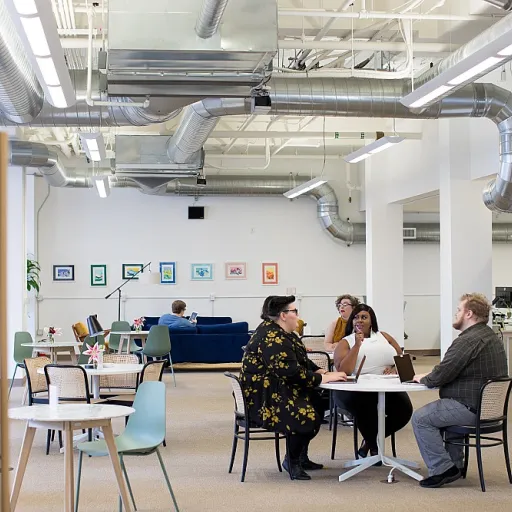
Understanding the evolving workforce landscape
Shifting Dynamics in the Manufacturing Labor Market
The manufacturing industry in the United Arab Emirates is experiencing rapid change. Companies are facing new challenges in workforce staffing, driven by global supply chain shifts, technological advancements, and evolving labor market trends. As demand for skilled workers grows, manufacturers must rethink their staffing strategies to remain competitive and meet future needs.- Global influences: The UAE's manufacturing sector is closely linked to international markets, including the United States. Disruptions in global supply chains and labor costs are pushing companies to adapt their staffing models, often turning to flexible staffing solutions and temporary staffing agencies to fill gaps quickly.
- Local labor market trends: Industrial staffing firms report a rise in demand for both permanent and temporary staff, especially in construction and industrial sectors. This trend is supported by data analysis showing a steady increase in the need for skilled talent and specialized services.
- Technological impact: Automation and digital transformation are reshaping the roles required in manufacturing. Companies are investing in upskilling workers and leveraging workforce staffing agencies to access talent with the right skills for new technologies.
Key skills and roles in demand
Emerging Roles and Essential Skills in the Manufacturing Industry
The manufacturing industry in the United Arab Emirates is experiencing rapid transformation. As companies adapt to technological advancements and global supply chain shifts, the demand for specific skills and roles is evolving. Manufacturers are not only seeking traditional labor but also specialized talent to meet new industry needs.
- Technical Skills: Automation, robotics, and data analysis are becoming essential. Workers with experience in industrial automation, supply chain management, and digital manufacturing are in high demand.
- Skilled Trades: There is a continued need for electricians, machinists, and technicians who can operate and maintain advanced machinery. These skilled workers are crucial for maintaining production efficiency and quality.
- Temporary and Flexible Staffing: To address fluctuating labor needs, many companies are turning to staffing agencies and temp staffing solutions. This approach helps manage labor costs and ensures access to a pool of temporary staff for peak periods.
- Workforce Planning and Analysis: Data-driven analysis is guiding workforce staffing decisions. Manufacturers are using workforce data to forecast staffing needs and identify gaps in talent supply.
- Supply Chain and Logistics: As supply chains become more complex, roles in logistics, procurement, and inventory management are increasingly important. These positions support the seamless flow of materials and products across the industry.
Manufacturing companies are also collaborating with staffing firms and industrial staffing agencies to access a broader range of talent. This partnership allows for more agile responses to market changes and supports long-term growth strategies.
For office managers and HR professionals, understanding these trends is vital. It helps in aligning recruitment strategies with the evolving labor market and ensures that companies remain competitive. For a deeper dive into how office managers can leverage external expertise, explore this guide to leading accounting firms in the Emirates.
| Role | Key Skills | Staffing Solutions |
|---|---|---|
| Automation Technician | Robotics, PLC programming, troubleshooting | Industrial staffing, temp staffing |
| Supply Chain Analyst | Data analysis, logistics, forecasting | Staffing agencies, long term contracts |
| Production Supervisor | Team leadership, process optimization | Workforce staffing, temporary workers |
| Quality Control Inspector | Attention to detail, compliance, reporting | Flexible staffing, temporary staff |
As the manufacturing sector continues to grow, companies will need to stay proactive in identifying and developing the right talent. This ensures they can meet both immediate and future staffing needs in a competitive labor market, both locally and in comparison to markets like the United States.
Navigating Emiratization policies and local talent development
Meeting Emiratization Goals While Addressing Talent Gaps
Manufacturing companies in the Emirates are facing a unique challenge: balancing Emiratization policies with the ongoing demand for skilled workers. Emiratization, a government-led initiative, encourages companies to increase the participation of Emirati nationals in the workforce. This policy is especially relevant in the industrial and manufacturing sectors, where the need for specialized skills and experience is high.
To comply with these regulations and address staffing needs, manufacturers are:
- Partnering with local universities and vocational institutes to nurture homegrown talent for roles in supply chain, industrial operations, and construction.
- Investing in training programs that equip Emirati workers with the technical and soft skills required by the manufacturing industry.
- Collaborating with staffing agencies and workforce staffing firms to identify and develop local talent pools, while also leveraging temporary staffing solutions to fill immediate labor gaps.
Data-driven analysis is becoming essential for companies to understand labor market trends and forecast future staffing requirements. By using workforce analytics, manufacturers can identify which skills are in highest demand and tailor their recruitment and training strategies accordingly. This approach not only helps meet Emiratization targets but also ensures a steady supply of qualified workers for both long term and temporary staff needs.
Industrial staffing solutions, including temp staffing and flexible staffing arrangements, are helping companies manage labor costs and adapt to fluctuating demand. However, the focus remains on building a sustainable pipeline of Emirati talent to support the industry’s growth and resilience.
For office managers and HR professionals, understanding how to balance these priorities is crucial. Insights from engaging films that highlight managerial skills can offer practical perspectives on leadership and talent development in a diverse workplace.
Adapting recruitment strategies for a competitive market
Strategic Approaches to Attracting and Retaining Talent
Manufacturing companies in the Emirates are facing an increasingly competitive labor market. As the demand for skilled workers rises, organizations must rethink their recruitment strategies to ensure a steady supply of talent. The manufacturing industry, like construction and industrial sectors, is experiencing rapid change due to technological advancements and evolving workforce needs.- Partnering with Staffing Agencies: Many manufacturers are turning to staffing agencies and staffing firms to access a broader pool of candidates. These agencies offer flexible staffing solutions, including temporary staffing and temp staffing, which help companies manage short-term projects and seasonal fluctuations without increasing long-term labor costs.
- Data-Driven Workforce Analysis: Leveraging workforce data and labor market analysis allows companies to anticipate staffing needs and identify gaps in skills supply. This proactive approach helps manufacturers stay ahead of industry trends and respond quickly to shifts in demand.
- Flexible Staffing Models: The use of temporary staff and temporary workers is becoming more common. Flexible staffing arrangements enable companies to scale their workforce up or down based on production requirements, supporting both operational efficiency and cost control.
- Collaboration with Educational Institutions: To address the shortage of skilled workers, some manufacturing companies are working closely with local universities and technical colleges. These partnerships help align training programs with industry needs, ensuring a pipeline of qualified talent for the future.
Enhancing Employer Branding and Candidate Experience
In a market where skilled labor is in high demand, manufacturers must differentiate themselves to attract top talent. Building a strong employer brand and offering competitive workforce staffing packages are essential. Companies are also investing in onboarding and training programs to ensure new hires are equipped with the necessary skills and feel valued from day one.Adapting to Industry Shifts and Supply Chain Demands
The manufacturing sector in the United Arab Emirates is closely linked to global supply chains. As disruptions occur, companies need agile recruitment strategies to fill critical roles quickly. Industrial staffing services and temporary staffing solutions provide the flexibility needed to respond to these challenges, helping manufacturers maintain productivity and meet customer expectations. Overall, adapting recruitment strategies is not just about filling vacancies. It is about building a resilient workforce that can support the long-term growth and competitiveness of manufacturing companies in the Emirates.Leveraging technology for smarter workforce planning
Smart Tools for Modern Workforce Staffing
Manufacturing companies in the Emirates are increasingly turning to technology to address staffing needs and stay ahead in the competitive industrial landscape. The integration of digital solutions is transforming how manufacturers manage workforce planning, optimize labor costs, and respond to fluctuating demand for skilled workers.
- Data-driven analysis: Advanced analytics platforms help companies forecast labor market trends, identify gaps in workforce skills, and anticipate future staffing requirements. This enables more accurate planning for both long-term and temporary staffing needs.
- Automation in recruitment: Digital staffing solutions, including AI-powered platforms, streamline the hiring process. These tools can quickly match candidates to open roles, reducing time-to-hire and improving the quality of talent acquisition for both permanent and temporary staff.
- Flexible staffing models: Technology enables manufacturers to collaborate with staffing agencies and staffing firms more efficiently. Cloud-based systems allow for real-time communication with industrial staffing partners, making it easier to scale up or down based on production cycles and supply chain demands.
- Workforce management systems: Modern software helps track employee performance, monitor labor costs, and ensure compliance with local regulations. This is especially valuable for companies operating in sectors like construction and manufacturing, where workforce needs can change rapidly.
By leveraging these technological advancements, manufacturing companies can build a more resilient and responsive workforce. The use of data and smart staffing solutions not only supports immediate labor needs but also helps companies prepare for future shifts in the manufacturing industry. Embracing these tools is essential for maintaining a competitive edge and ensuring the supply of skilled workers in the United Arab Emirates.
Building a resilient and diverse workplace culture
Fostering Inclusion and Flexibility in the Manufacturing Workplace
Manufacturing companies in the Emirates are recognizing that a resilient workforce is built on diversity, adaptability, and a supportive environment. As the industry evolves, the need for skilled workers and flexible staffing solutions becomes more urgent. Companies are not only focusing on hiring but also on creating a workplace culture that attracts and retains top talent.- Diversity Drives Innovation: Industrial manufacturers are increasingly valuing diverse perspectives. By bringing together workers from different backgrounds, companies can better respond to shifting labor market demands and supply chain challenges. This approach also helps address skills gaps and supports long-term growth.
- Flexible Staffing Models: The use of staffing agencies, temp staffing, and temporary workers is on the rise. These solutions allow manufacturers to quickly adapt to changes in demand, manage labor costs, and ensure a steady supply of skilled labor. Temporary staffing and industrial staffing firms provide access to a wider pool of talent, supporting both short-term projects and ongoing needs.
- Data-Driven Workforce Analysis: Manufacturers are leveraging data and technological advancements to analyze workforce needs. This helps companies anticipate future staffing requirements, optimize workforce staffing, and make informed decisions about recruitment and training. Data analysis also supports compliance with local labor regulations and Emiratization policies.
- Employee Wellbeing and Engagement: Building a resilient culture means prioritizing the wellbeing of workers. Companies are investing in services that support employee development, safety, and satisfaction. Engaged workers are more likely to stay with the company, reducing turnover and supporting a stable labor supply.













